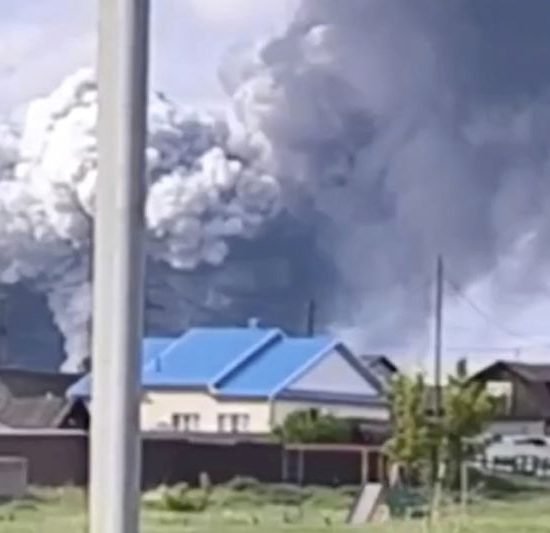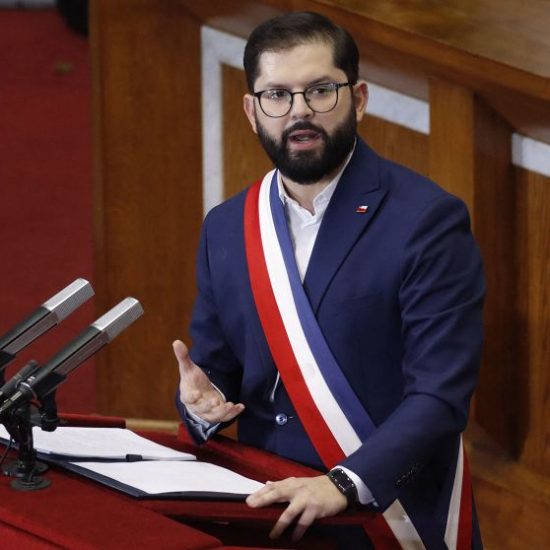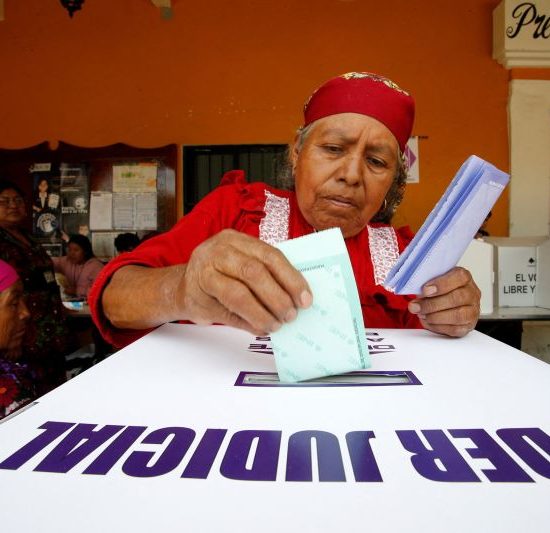US President Donald Trump on Wednesday had tea with a former jihadist who until recently had a $10 million US bounty on his head.
Interim Syrian President Ahmed al-Sharaa, once known by his militant nom de guerre Abu Mohammed al-Jolani, met Trump in Riyadh six months after leading a swift campaign that toppled the half-a-century-old Assad regime, ejecting Iran-backed armed groups and declaring himself leader of the country.
Al Sharaa was placed on the US Specially Designated Global Terrorist list in 2013 for heading al Qaeda’s affiliate in Syria, known as Al Nusra Front, and allegedly orchestrating suicide bombings across Syria. The Saudi-born former jihadist had spent years fighting US forces in Iraq before moving to Syria to lead an armed Islamist rebellion that ousted the brutal dictator Bashar al-Assad.
The meeting, described by Syria as “historic,” was the first between a US and Syrian president in 25 years, taking place during Trump Middle East tour, the first set of state visits of his second term.
Both leaders were seen smiling in photos released by the White House and the Saudi foreign ministry. The Syrian foreign ministry said Trump committed to “standing by Syria at this critical juncture.”
A day earlier, Trump announced the removal of decades-old sanctions on Syria, a move that prompted a 40-second-long applause from the audience, including a standing ovation from the Saudi Crown Prince Mohammed bin Salman.
“Oh, what I do for the Crown Prince,” Trump told the room on Tuesday, crediting the de facto Saudi leader for leading the effort to lift what the president called “brutal and crippling” sanctions. Syria has been designated by the US as a State Sponsor of Terrorism since December 1979.
Syria’s economy has been crippled for years by Western sanctions. Among the harshest is the US’ 2019 Caesar Act, which imposed wide-ranging sanctions that restricted individuals, companies or governments from economic activities assisting Assad’s war effort. The act rendered the entire economy untouchable. According to the World Bank, the country’s economy shrank by more than half between 2010 and 2020.
As of 2022, poverty was affecting 69% of Syria’s population, according to the World Bank. Extreme poverty affected more than one in four Syrians in 2022, the bank said, adding that this number likely deteriorated after a devastating earthquake in February 2023.
Gulf states have been keen to invest in Syria and prop up its economy but have been wary of violating US sanctions. Trump’s move is likely to remove such barriers, making way for potentially billions of dollars in investments.
During the meeting, Trump proposed that Sharaa take a series of measures, including normalization with Israel, expelling foreign and Palestinian “terrorists,” and helping the US to prevent the resurgence of ISIS, according to the White House.
“The fact that he (Trump) did it so publicly and from Riyadh I think is a sort of tacit approval for those who are looking to invest in Syria potentially as well,” Natasha Hall of the Middle East Program at the Center for Strategic and International Studies (CSIS) said. “(It) means that he is giving wins to Mohammed bin Salman.”
Cautious optimism among Syrians
Fireworks lit up the skies in some of Syria’s biggest cities after Trump announced the lifting of sanctions. Billboards were erected thanking Trump and Prince Mohammed.
“I don’t know how life would be without sanctions,” said Ranim Sakhal, who said she has lived under sanctions since she was born in the 1970s. “The country has been suffocating.”
“People are optimistic and our dream is for Arab countries to help, which is something we haven’t seen for years because of Bashar’s rivalry with Arab leaders,” Sakhal added.
Syria’s currency, the Lira, rose by as much as 27% against the US dollar following the announcement. The country’s economy and trade minister, Mohammad Nidal al-Shaar, shed tears live on air with Saudi outlet Al Arabiya, as he underscored that Syria is “now entering a new phase.”
But the optimism is not universal. The lifting of sanctions would go far in giving legitimacy to Sharaa’s new regime, and some in Syria are concerned about how minorities will be treated by the former jihadists.
“We face a number of extremist groups that restrict freedoms,” he said. “If a guy and a girl are seen together in public, the guy could be detained and just disappear. Men can be beaten for wearing shorts… it’s an extreme infringement on personal freedoms.”
In March, armed men loyal to the new Syrian regime carried out field executions and spoke of purifying the country after a crackdown against remnants of the former Assad regime spiraled into communal killings against the Alawite minority. The United Nations said at the time that entire families, including women and children, were killed during the violence.
An opportunity for Saudi Arabia
For decades, Gulf Arab states were left out of Syria as their rival Iran expanded its influence in the country through its alliance with the Assad regime.
A decade-long civil war in Syria severely strained relations between Damascus and most Arab states, eventually culminating in Syria’s expulsion from the Arab League. Over the past few years, Gulf states began mending fences with the Assad regime and were leading the effort to rehabilitate him until he was abruptly ousted from power in December. Since then, Saudi Arabia and Qatar doubled down on getting the new regime re-integrated into the international community.
Saudi Foreign Minister Faisal bin Farhan announced on Wednesday that Riyadh will be at the “forefront” of Syria’s economic revival. Its efforts could allow it to become a significant player in the country and expand its influence there for the first time.
“Syria will not be alone. Saudi Arabia… will be at the forefront of the supporters to that economic awakening… (Syria) needs a push, and it will receive that push from its brothers in the region,” bin Farhan said at a news conference on Wednesday.
Hasan Alhasan, a senior fellow at the International Institute for Strategic Studies, said Saudi Arabia has “geostrategic interests in the Middle East” that can be achieved through support for the current Syrian regime.
“Saudi Arabia wants Syria to be stable, it recognizes that the only way in which you can get to a stable Syria is by providing the current administration with the economic resources and tools to deliver a so-called victory,” he said.
Defying Israel
During the Biden administration, the US and Saudi Arabia were close to reaching a comprehensive security and economic agreement that would have led to the normalization of relations between the kingdom and Israel.
Despite Trump’s desire for Saudi Arabia to recognize Israel, no such normalization materialized during his visit to Riyadh. Instead, the president said he would establish ties with Sharaa, a move that defied Israel, which has repeatedly bombed Syria and seized more of its territory since the fall of Assad.
Netanyahu had taken an aggressive stance with Sharaa and his new government. In the days that followed Assad’s ouster, he ordered an unprecedented ground push into Syria, driving Israeli forces deeper into the country than ever before and upending Israel’s 50-year tacit détente with the Assads.
The escalation quickly abandoned Netanyahu’s initial pledge to practice “good neighborliness” to the new Syria. Hundreds of airstrikes targeted the remnants of Assad’s weaponry, particularly its chemical weapons, to prevent them from falling into the hands of militant groups, and Israeli forces seized Mount Hermon, Syria’s highest peak, and a strategically vital position overlooking Israel, Lebanon, and Syria.
“We toppled the Assad regime, which essentially was used as the land link between Iran and Hezbollah in Lebanon,” Netanyahu said in a video statement last week.
After meeting Sharaa on Wednesday, Trump heaped praise on him, calling him a “great young attractive guy,” with a “very strong past” who is “a fighter.” The new Syrian President, he said, has “got a real shot at pulling it together.”





